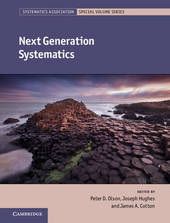
|
Next Generation Systematics
Hardback
Main Details
| Title |
Next Generation Systematics
|
| Authors and Contributors |
Edited by Peter D. Olson
|
|
Edited by Joseph Hughes
|
|
Edited by James A. Cotton
|
| Series | Systematics Association Special Volume Series |
|---|
| Physical Properties |
| Format:Hardback | | Pages:351 | | Dimensions(mm): Height 256,Width 191 |
|
| Category/Genre | Life sciences - general issues |
|---|
| ISBN/Barcode |
9781107028586
|
| Classifications | Dewey:578.012 |
|---|
| Audience | | Professional & Vocational | |
|---|
| Illustrations |
5 Tables, black and white; 8 Plates, color; 32 Halftones, unspecified; 8 Line drawings, unspecified
|
|
Publishing Details |
| Publisher |
Cambridge University Press
|
| Imprint |
Cambridge University Press
|
| Publication Date |
16 June 2016 |
| Publication Country |
United Kingdom
|
Description
We live in an age of ubiquitous genomics. Next generation sequencing (NGS) technology, both widely adopted and advancing at pace, has transformed the data landscape, opening up an enormous source of heritable characters to the comparative biologist. Its impact on systematics, like many other fields of biology, has been felt throughout its breadth: from defining species boundaries to estimating their evolutionary histories. This volume examines the broad range of ways in which NGS data are being used in systematics and in the fields that it underpins, from biodiversity prospecting to evo-devo. Experts in their fields draw on contemporary case studies to demonstrate state-of-the-art applications of NGS data. These, along with novel analyses, comprehensive reviews and lively perspectives, are combined to produce an authoritative account of contemporary issues in systematics that have been impacted by the adoption of NGS.
Author Biography
Peter D. Olson is a Researcher in the Department of Life Sciences at the Natural History Museum, London. His research integrates comparative, developmental and genomic studies of parasitic flatworms aimed at unravelling the genetic basis of their evolution. He became involved in the field of molecular phylogenetics when PCR and manual sequencing were being widely used to generate the first ribosomal-based estimates of animal phylogeny. Joseph Hughes is an evolutionary biologist working at the Medical Research Council - at the University of Glasgow Centre for Virus Research. He is especially interested in understanding the evolutionary forces that have shaped the solutions that different species have found to adapt to their environment. He has embraced the deluge of data from high throughput sequencing platforms and currently mainly works on non-living particles known as viruses. James A. Cotton is a Senior Staff Scientist in the Parasite Genomics group at the Wellcome Trust Sanger Institute. His background is in phylogenetic theory and methods, and he now leads projects on comparative, evolutionary and population genomics of parasites of medical and veterinary importance.
Reviews'... the book provides a very good overview of how the field of systematics is being shaped by the impact of a promising technology. In focusing on the major achievements and the challenges ahead it conveys a realistic vision for the future. One that has the potential to motivate many readers to embrace these approaches or to focus on solving the mentioned challenges.' Toni Gabaldon, The Quarterly Review of Biology
|